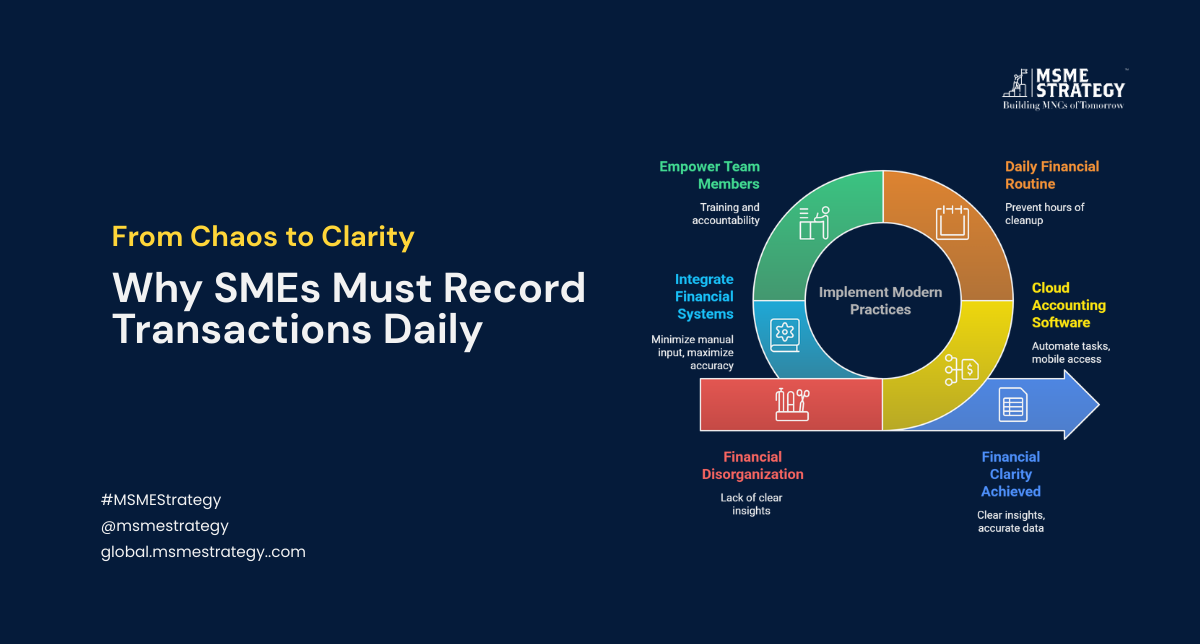While many enterprises still approach bookkeeping as a monthly or quarterly task, the discipline of recording transactions daily can be transformative. Beyond keeping the numbers clean, it empowers real-time decision-making, strengthens financial discipline, and positions businesses to respond with speed in competitive markets.
Preventing Data Backlogs
One of the most immediate advantages of daily recording is the prevention of data backlogs. When information is captured in real-time, there’s little risk of lost receipts, overlooked entries, or late reconciliations. SMEs avoid the stress of scrambling at month-end or during tax season. Instead, reconciliations are faster, more accurate, and significantly less prone to costly errors.
This proactive discipline ensures that financial systems remain streamlined and always audit-ready.
Identifying Cash Flow Patterns Early
Cash flow is often the lifeblood of SMEs—and daily records provide the visibility needed to protect it. Recording transactions consistently makes it possible to detect cash flow patterns and anomalies as they emerge.
For instance:
· A sudden uptick in operational costs
· Delays in client payments
· Seasonal dips or unexpected surges in sales
Spotting these early allows managers to adjust budgets, negotiate better terms, or introduce preventive measures before issues escalate. In this way, SMEs can move from reactive fire-fighting to proactive financial leadership.
Enabling Real-Time Financial Clarity and Nimbleness
Markets today demand speed. Daily transaction tracking delivers up-to-date financial clarity—empowering leaders to base decisions on facts, not outdated assumptions. With this level of transparency, SMEs can:
· Forecast more accurately
· Respond swiftly to new opportunities
· Pivot quickly in volatile markets
Moreover, daily discipline builds stronger financial habits across the organization, embedding accountability and operational rigor into everyday business practices.
Key Benefits at a Glance
· Cash flow visibility: Instantly track available cash and prevent overdrafts.
· Reduced errors: Avoid duplicates, omissions, and messy reconciliations.
· Better compliance: Simplify tax filings and boost audit readiness.
· Actionable insights: Catch financial shifts early and adjust strategies faster.
Tools and Best Practices
The key to making this work lies in modern tools and routines:
· Leverage cloud accounting software with automation features, mobile apps, and live dashboards.
· Set a simple daily routine—just 10–15 minutes a day can prevent hours of cleanup later.
· Empower your team with training and accountability so financial clarity becomes part of company culture.
· Integrate systems (POS, banking, invoicing) to minimize manual input and maximize accuracy.
Actionable Takeaways for SMEs
1. Start Small: Begin by recording all cash inflows and outflows daily before expanding to full integration.
2. Automate Where Possible: Use tools that sync with bank accounts to minimize manual effort.
3. Monitor Cash Flow Weekly: Use daily data to prepare short weekly reports for better visibility.
4. Build Discipline Across Teams: Ensure staff at every level understand the importance of timely entries.
5. Review Trends Monthly: Turn daily numbers into strategic insights, not just compliance records.
The discipline of daily transaction recording isn’t about micromanagement—it’s about building clarity, discipline, and competitive agility. For SMEs aiming to grow sustainably and operate with confidence in global markets, this practice is no longer optional. It’s essential. At MSME Strategy Consultants (global.msmestrategy.com), experienced consultants are ready to help SMEs design smarter financial systems, adopt global best practices, and turn data discipline into a competitive edge.
Suggested Hashtags:
#GlobalMSMEStrategy #SMEGrowth #FinancialClarity #CashFlowManagement #AgileBusines






